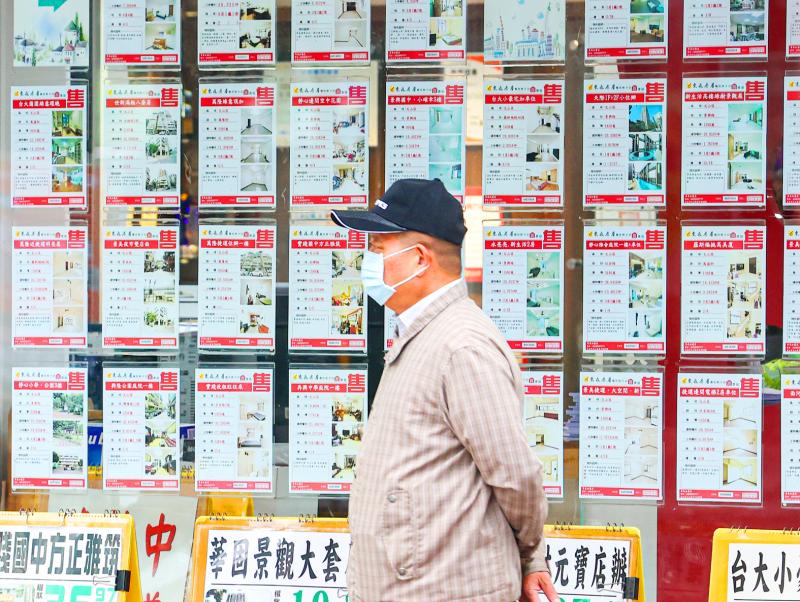The Kaohsiung City Government yesterday said it would impose a property hoarding tax as it is seeking to contain speculation in the real-estate market, calling recent price increases “abnormal.”
The announcement came in support of the Ministry of Finance’s call for local governments to levy a high tax rate on people with more than one property.
Ministry officials on Tuesday discussed strategies to rein in speculation with the nation’s six special municipalities, as well as the Hsinchu city and county governments.

Photo: CNA
About 84,000 out of 1.06 million housing units in Kaohsiung are not residential property, the city government said in a statement yesterday.
The city would implement the hoarding tax based on three principles: fulfilling housing justice, keeping individual houses intact and ensuring that owners do not pass on the costs to renters, it said.
The city government has not yet decided on the tax rate, which would be subject to approval by city councilors, it said.
The ministry levies a tax of 1.5 to 3.6 percent on non-residential housing units and allows local governments to add their own taxes, capped at 30 percent.
The Taipei City Government levies a 2.4 percent hoarding tax for units held by owners with fewer than two units and 3.6 percent for those who own more than three units.
The Kaohsiung City Government said it is also stepping up efforts to build 10,500 social housing units and offering subsidies for renters to safeguard people’s fundamental right of housing.
City authorities would continue cracking down on illegal housing transactions involving nonbinding contracts.
Meanwhile, the Tainan City Government is planning to impose a hoarding tax next year.
At the meeting at the ministry, representatives from New Taipei City, Taoyuan, Taichung, and Hsinchu city and county also agreed to impose hoarding taxes.

South Korea’s equity benchmark yesterday crossed a new milestone just a month after surpassing the once-unthinkable 5,000 mark as surging global memory demand powers the country’s biggest chipmakers. The KOSPI advanced as much as 2.6 percent to a record 6,123, with Samsung Electronics Co and SK Hynix Inc each gaining more than 2 percent. With the benchmark now up 45 percent this year, South Korea’s stock market capitalization has also moved past France’s, following last month’s overtaking of Germany’s. Long overlooked by foreign funds, despite being undervalued, South Korean stocks have now emerged as clear winners in the global market. The so-called “artificial intelligence

‘SEISMIC SHIFT’: The researcher forecast there would be about 1.1 billion mobile shipments this year, down from 1.26 billion the prior year and erasing years of gains The global smartphone market is expected to contract 12.9 percent this year due to the unprecedented memorychip shortage, marking “a crisis like no other,” researcher International Data Corp (IDC) said. The new forecast, a dramatic revision down from earlier estimates, gives the latest accounting of the ongoing memory crunch that is affecting every corner of the electronics industry. The demand for advanced memory to power artificial intelligence (AI) tasks has drained global supply until well into next year and jeopardizes the business model of many smartphone makers. IDC forecast about 1.1 billion mobile shipments this year, down from 1.26 billion the prior

Chinese artificial intelligence (AI) start-up DeepSeek’s (深度求索) latest AI model, set to be released as soon as next week, was trained on Nvidia Corp’s most advanced AI chip, the Blackwell, a senior official of US President Donald Trump’s administration said on Monday, in what could represent a violation of US export controls. The US believes DeepSeek will remove the technical indicators that might reveal its use of American AI chips, the official said, adding that the Blackwells are likely clustered at its data center in Inner Mongolia, an autonomous region of China. The person declined to say how the US government received

People stand in a Pokemon store in Tokyo on Thursday. One of the world highest-grossing franchises is celebrated its 30th anniversary yesterday.